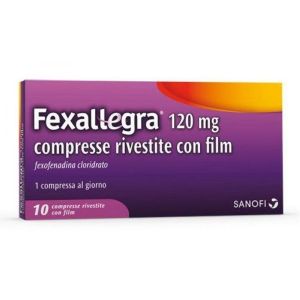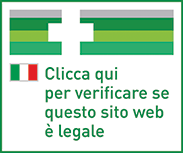Ship in Europe, Find out rates!

Fexallegra 10 Tablets 120mg
SANOFI
Symptomatic treatment of seasonal allergic rhinitis.
Technical data sheet (RCP) Excipients:
Fexofenadine does not undergo hepatic biotransformation and therefore will not interact with other medicinal products at the level of hepatic mechanisms. Co-administration of fexofenadine hydrochloride and erythromycin or ketoconazole has been found to increase the plasma levels of fexofenadine 2–3 fold. These changes were not accompanied by any effects on the QT interval and were not associated with any increase in adverse reactions compared to that observed with the same medicinal products administered individually. Animal studies have shown that the increase in plasma levels of fexofenadine observed after concomitant treatment with erythromycin or ketoconazole appears to be caused by an increase in gastrointestinal absorption and a decrease in both biliary excretion and gastrointestinal secretion, respectively. No interaction was observed between fexofenadine and omeprazole. However, administration of an antacid containing aluminum and magnesium hydroxide 15 minutes prior to administration of fexofenadine hydrochloride resulted in a reduction in bioavailability, most likely due to binding in the gastrointestinal tract. An interval of 2 hours is recommended between the administration of fexofenadine hydrochloride and antacids containing aluminum and magnesium hydroxide.
Technical data sheet (RCP) Composition:
Each tablet contains 120 mg of fexofenadine hydrochloride, equivalent to 112 mg of fexofenadine. For the full list of excipients, see section 6.1.
Contraindications
The product is contraindicated in patients with hypersensitivity to the active substance or to any of the excipients listed in section 6.1.
Dosage
Adults The recommended dose of fexofenadine hydrochloride for adults is 120 mg once daily, before meals. Fexofenadine is a pharmacologically active metabolite of terfenadine.
Pediatric population Children aged 12 years and above The recommended dose of fexofenadine hydrochloride for children aged 12 years and above is 120 mg once daily, before meals. Children below 12 years of age The efficacy and safety of fexofenadine hydrochloride 120 mg have not been studied in children below 12 years of age. In children 6 to 11 years of age: fexofenadine hydrochloride 30 mg tablets is the appropriate formulation for administration and dosage in this population.
Special populations Studies performed in groups of patients at risk (elderly, patients with renal or hepatic insufficiency) indicate that it is not necessary to adjust the dose of fexofenadine hydrochloride in these patients.
Warnings
As with most new medicinal products, data in elderly subjects and in patients with impaired renal or hepatic function are limited. Fexofenadine hydrochloride should be administered with caution to such groups of subjects. Patients with previous or current cardiovascular disease should be advised that antihistamines, as a class of medicinal products, have been associated with adverse reactions such as tachycardia and palpitations (see section 4.8).
